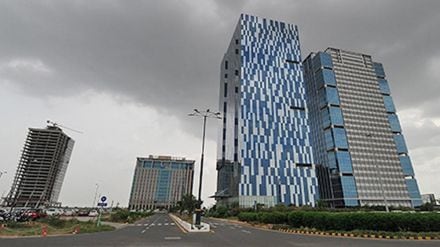A year after starting operations at GIFT City in Gandhinagar, Australia’s Deakin University and the University of Wollongong (UOW) — the first foreign university campuses to set up in India — have received mixed responses. Both institutions continue to face several challenges, including expanding small student cohorts, and attracting foreign faculty.
Deakin GIFT and UOW India commenced their inaugural cohorts in July 2024 and November 2024, respectively. Their curriculum, aimed at fostering problem-solving, upskilling, and peer learning, serves as a key selling point. This approach aligns with GIFT City’s growing need for skilled professionals in financial management, fintech, science, technology, engineering, and mathematics, as outlined by the International Financial Services Centres Authority (IFSCA).
Industry-focused education
Deepak Bajaj, campus director of Deakin University GIFT, emphasised that courses designed to make students more industry-ready are crucial for attracting enrolments and ensuring strong placements.
“As a new university, ensuring top-tier placements for students is the challenge. Which is why Deakin’s programme aims to equip students with industry-relevant skills and knowledge,” he said.
This approach appears to have been well received by students, who hope to benefit from accredited foreign degrees at considerably lower costs than studying abroad.
Student perspectives
Prajwal Bharad, a student at UOW India pursuing a master’s in financial technology (fintech), said the campus presented a valuable alternative to studying overseas.
“I was keen to pursue fintech due to its growing presence in India. In the three months since my course began at UOW, I have learnt programming like Python from scratch and now have a solid understanding of data analytics,” he said.
According to Mordor Intelligence, India’s fintech market is currently valued at $44.12 billion and is projected to rise exponentially to $95.3 billion by 2030. The rapid adoption of technology across industries, particularly in GIFT City, has generated growing interest among students in fintech-related programmes.
Shiwangi Mishra, another UOW India student pursuing a fintech master’s degree, highlighted the value of affordable education. “Apart from the course fees, we don’t have to bear hefty additional costs for boarding and lodging fees compared to students abroad. At UOW India, I obtained a 50% scholarship, which reduced my course fees to Rs 10–11 lakh, and I am learning from a curriculum designed to train students practically rather than theoretically,” she said.
Ritik Kumawat, part of Deakin GIFT’s first student cohort, is among seven students awaiting to begin roles at the National Australia Bank (NAB) Innovation Centre India in Gurugram. “Apart from the practical skills, we were also assigned projects wherein we understood and aimed to solve industry-specific problems with mentors of different companies based in GIFT City,” he said.
With placements ongoing at Deakin University GIFT, around 30% of the first batch has been placed so far. The university plans to host its first graduation ceremony in early 2026.
Changing study abroad trends
Nimay Kalyani, campus director of UOW India, believes current geopolitical developments could shift trends among Indian students aspiring to study overseas. “Amidst rising costs to study abroad, coupled with visa restrictions on international students, graduating at a lower cost in your home ground with an accredited international degree is a good alternative,” he said.
Australia remains a popular destination for Indian students. According to Australian government data, 2,734 Indians were granted student visas in February 2025. However, the recent cap on international student enrolments and restrictions imposed on applicants from six Indian states have introduced uncertainty for prospective students.
Small cohorts and faculty concerns
Despite optimism, both campus directors acknowledge they are still operating with limited student numbers. Deakin GIFT currently has 70 students across two batches, while UOW India has enrolled 28 students. Deakin GIFT shares the ground floor of its building with another company, and UOW India operates from a single floor in GIFT City’s Pragya II building.
While both institutions charge around Rs 14–21 lakh in fees, most of their teaching staff are Indian. This has drawn criticism from academics and students, who argue that the cost and branding of foreign universities in India are disproportionate to the facilities and international exposure being offered.
A vice-chancellor of a private Indian university also commented that the fees and branding of these foreign institutions are not fully aligned with the level of faculty and facilities currently available to students.
Future outlook
Deakin and UOW will soon be joined by the UK’s Queen’s University Belfast (QUB) and Coventry University, which have received official approval from GIFT City authorities. This signals growing interest among foreign universities in tapping into India’s vast student base and contributing to the country’s emerging global education hub.
